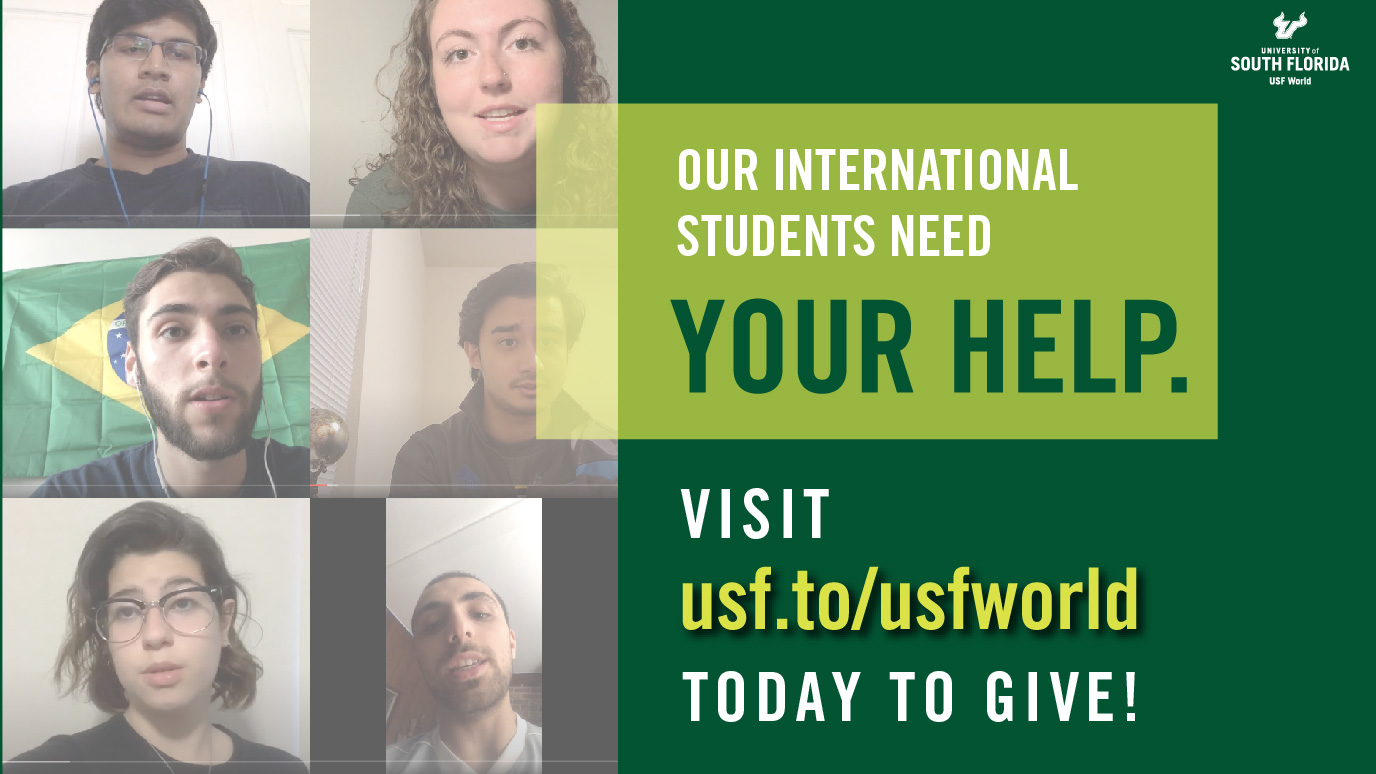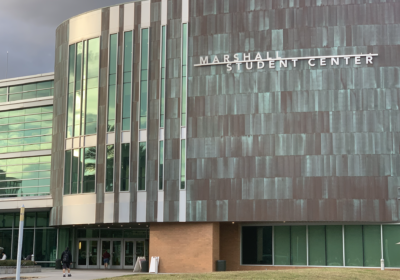USF World launches fund supporting international students

As some international students deal with financial hardships and are unable to return to their home country due to the coronavirus (COVID-19) pandemic, USF World decided to create an alternative.
USF World launched the International Student Support Fund on May 12 and is collecting donations from the USF community until June 30 to supplement international students who cannot receive FAFSA or CARES Act funds from the federal government.
As of May 20, a total of $7,842 has been raised by 92 donors.
International Student and Scholar Services Director Marcia Taylor said the fund will operate based on need.
“It is my understanding the fund would be distributed sometime in June and then maybe some in July,” Taylor said. “And then if we feel there is a continued need we’ll find a way to have another application period if we need to.”
The amount of money allotted to each recipient has yet to be decided and will depend on the total collected from donations, according to Taylor. Once the application period opens, Taylor said the maximum amount one student can be awarded is $1,500.
Taylor said there was no set goal for the amount of donations and she plans to continue collecting past the original June 30 deadline.
“We would love to raise thousands and thousands of dollars,” Taylor said. “Right now, we have the fund open until June 30, and the money is going up day by day and hour by hour. We do foresee a continuation, after the HerdFunder is done, continuing to try and find major donors to make sure that there is a USF World International Student Support Fund for the future.”
There’s a clear need for the fund. While some international students relied on their on-campus jobs to pay bills, many were furloughed as campus operations were interrupted as a result of COVID-19.
Systemwide Student Body Vice President Gustavo Spangher, a third-year business student from Brazil, said finances have been a concern since the beginning of his college career. Because of the pandemic, his family in Brazil is struggling with unemployment.
“If I hadn’t gotten my job as a resident assistant, which pays for my housing and meal plan in my second year, I couldn’t have afforded to stay and continue my education here in the U.S.,” Spangher said. “Now with this pandemic, my entire family hasn’t had any means of making income. They are all stuck at home and I’m by myself here, stuck in the university.”
Of the students’ families who are still able to work and earn an income, some are not making as much money as usual.
Olivier Fourcand, a sophomore majoring in accounting from Haiti, said his mother is not earning her normal salary due to the pandemic.
“My mom is a business owner, so she is receiving less of an income,” Fourcand said. “She provides her employees with transportation and free masks every day, and pays for clean water for customers to wash their hands when they enter. She is earning about 75 percent of her normal income.”
Aside from the fund, international students can apply for special work permission through an application for severe economic hardship from the United States Citizenship and Immigration Services (USCIS). Conditions to apply include loss of financial and/or on-campus employment and fluctuations in the value of currency or exchange rate, according to the USF World website.
Eligible students must have a valid F-1 visa, good academic standing and have been enrolled as a full-time student for at least one full academic year. Once their work permission is approved, students can work a maximum of 20 hours per week when school is in session.
Because of the pandemic, many national currencies have been devalued compared to the American dollar, so parents sending their children money from abroad to pay for housing, food, and other expenses now pay much more than they normally would. The process itself of sending money abroad has also been greatly impacted since the spread of the pandemic.
For Junayed Jahangir, a second-year business student from Bangladesh, the pandemic has significantly affected the transfer of money in his country.
“Back in my country people have to go to the bank, show them their transcript and then the bank authorizes the money to be transferred from my country to my bank account,” Jahangir said.
“Now, since the country is in a lockdown, people can’t go to the banks, and if they can’t go to the banks, they can’t do the processing in the first place, and if they can’t do the processing, I never get the money.”
While some students are facing financial hardships due to COVID-19, others were unable to return to their home countries after international flights were canceled and borders were closed indefinitely.
Harit Manoj, a third-year student majoring in quantitative economics and econometrics and political science from Dubai, is apart from his family during the pandemic. As new immigration regulations are implemented and borders remain closed, Manoj decided to stay in the U.S. fearing that if he left, he would not be able to return in the fall.
“There’s no way of me being able to go back home … hypothetically if I was [able to], I believe it would be challenging for me to come back to the States anytime soon,” Manoj said.
As students struggle to manage finances amid the coronavirus pandemic, Taylor said that while the fund will offer one option for financial assistance, USF World will be assisting students through remote appointments to explore other financial aid options.
“Our office understands that this is a difficult time financially and this fund is one option to assist students, but students who find themselves in financial need should contact our office to see if there are other things that we can do to assist,” Taylor said.






